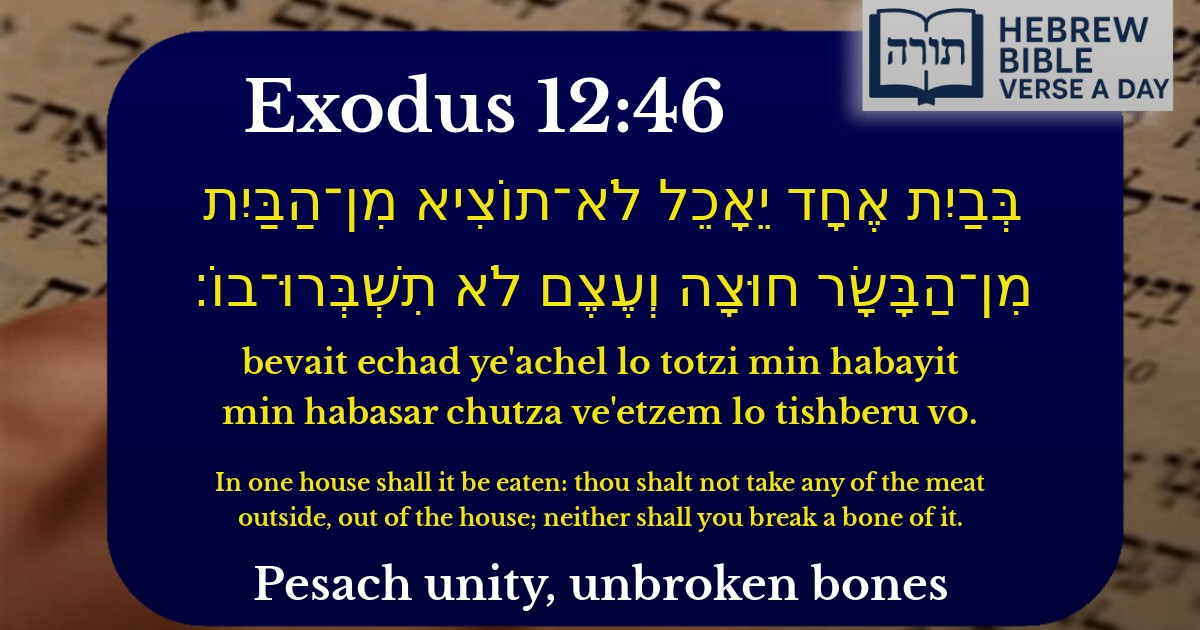Join Our Newsletter To Be Informed When New Videos Are Posted
Join the thousands of fellow Studends who rely on our videos to learn how to read the bible in Hebrew for free!
Hebrew Text
בְּבַיִת אֶחָד יֵאָכֵל לֹא־תוֹצִיא מִן־הַבַּיִת מִן־הַבָּשָׂר חוּצָה וְעֶצֶם לֹא תִשְׁבְּרוּ־בוֹ׃
English Translation
In one house shall it be eaten: thou shalt not take any of the meat outside, out of the house; neither shall you break a bone of it.
Transliteration
Bevait echad ye'achel lo totzi min habayit min habasar chutza ve'etzem lo tishberu vo.
Hebrew Leining Text
בְּבַ֤יִת אֶחָד֙ יֵאָכֵ֔ל לֹא־תוֹצִ֧יא מִן־הַבַּ֛יִת מִן־הַבָּשָׂ֖ר ח֑וּצָה וְעֶ֖צֶם לֹ֥א תִשְׁבְּרוּ־בֽוֹ׃
בְּבַ֤יִת אֶחָד֙ יֵאָכֵ֔ל לֹא־תוֹצִ֧יא מִן־הַבַּ֛יִת מִן־הַבָּשָׂ֖ר ח֑וּצָה וְעֶ֖צֶם לֹ֥א תִשְׁבְּרוּ־בֽוֹ׃
🎵 Listen to leining
Parasha Commentary
📚 Talmud Citations
This verse is quoted in the Talmud.
📖 Pesachim 85b
The verse is discussed in the context of the laws regarding the Passover sacrifice, particularly the prohibition of breaking any bones of the sacrifice and the requirement to eat it within one house.


Context of the Verse
The verse (Exodus 12:46) is part of the Torah's instructions regarding the Korban Pesach (Paschal sacrifice), which was to be eaten by the Jewish people in Egypt on the night of their redemption. The verse emphasizes two key prohibitions: not removing the meat from the house where it is being eaten and not breaking any of its bones.
Prohibition Against Removing the Meat
Rashi explains that the phrase "לֹא־תוֹצִיא מִן־הַבַּיִת" ("thou shalt not take any of the meat outside") teaches that the Paschal lamb must be eaten in a designated group setting, reinforcing the idea of unity among the Jewish people during the redemption. The Midrash (Mechilta) adds that this prohibition also serves to distinguish the Korban Pesach from ordinary meat, elevating its sanctity.
Prohibition Against Breaking Bones
The command "וְעֶצֶם לֹא תִשְׁבְּרוּ־בוֹ" ("neither shall you break a bone of it") is interpreted by Rambam (Hilchot Korban Pesach 9:12) as a sign of respect for the sacrifice. Breaking bones would imply treating it as mere food rather than a sacred offering. The Talmud (Pesachim 84a) further notes that this prohibition applies even after the meat has been consumed, ensuring the integrity of the bones.
Symbolism and Deeper Meaning
Halachic Implications
According to the Shulchan Aruch (Orach Chaim 476:1), these prohibitions remain relevant in the laws of the Seder, where the Afikoman (representing the Korban Pesach) is eaten in a manner reminiscent of the original sacrifice. The Rema adds that one should be careful not to break the matzah in a way that resembles breaking bones, preserving the memory of these commandments.